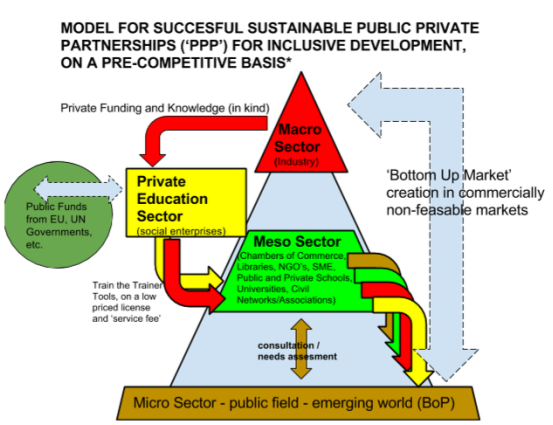
Strategy
CERES originated (in November 2011) from the need to make women aware of something that was discussed excessively by the highest political bodies since 2009. The FAO, the UN and Governments emphasized the important role of women in global Food Security.
80% of the food is produced by women (seeds workers in the South) and 80% of the food is purchased by women. At the large food companies and in politics, however, few women have a say in the policy. Women are often discussed and used in an 'instrumental' manner: "give them seeds, money and crop protection product to increase food production" and "focus on women in food marketing".
CERES wants women know how important they are and to act from a sense of interdependence (= take responsibility from autonomy). To this end, education is crucial. The education sector is largely led by women.
From the creation in March 2012 up until 2015 our focus was on the involvement of women's networks at the theme of Food Security. Through a rural road show and the distribution of the CERES DVD we reached a large group of women, which is continued by the networks themselves. More than 1 million women in Netherlands are affiliated with women's networks that have monthly meetings, so that the discussion can be easily continued. CERES allows for the deepening of the discussion using 'early adopters', such as speakers, writers, entrepreneurs, and educators.
In our blog up to 2015 the progress with women's networks has been decribed. We have had a lot of (returning) website visitors and a lot of media attention (especially through the news channels of the women networks themselves). From 2015 we are in a new phase, which we had as our goal from the beginning (see page why): we encourage setting up sustainable international public Private Partnerships (PPP) according to a holistic model. In that model a crucial role is laid out for the education sector and for women entrepreneurs (called 'meso sector'). We started CERES ACADEMY in this context.
CERES furthers in this way that the large public funds are used for their intended beneficiaries: the public. Get involved in this challenging phase! Are you interested to contribute with your knowledge and experience, visit our website regurlarly and stay informed of the progress first-hand.
CERES originated (in November 2011) from the need to make women aware of something that was discussed excessively by the highest political bodies since 2009. The FAO, the UN and Governments emphasized the important role of women in global Food Security.
80% of the food is produced by women (seeds workers in the South) and 80% of the food is purchased by women. At the large food companies and in politics, however, few women have a say in the policy. Women are often discussed and used in an 'instrumental' manner: "give them seeds, money and crop protection product to increase food production" and "focus on women in food marketing".
CERES wants women know how important they are and to act from a sense of interdependence (= take responsibility from autonomy). To this end, education is crucial. The education sector is largely led by women.
From the creation in March 2012 up until 2015 our focus was on the involvement of women's networks at the theme of Food Security. Through a rural road show and the distribution of the CERES DVD we reached a large group of women, which is continued by the networks themselves. More than 1 million women in Netherlands are affiliated with women's networks that have monthly meetings, so that the discussion can be easily continued. CERES allows for the deepening of the discussion using 'early adopters', such as speakers, writers, entrepreneurs, and educators.
In our blog up to 2015 the progress with women's networks has been decribed. We have had a lot of (returning) website visitors and a lot of media attention (especially through the news channels of the women networks themselves). From 2015 we are in a new phase, which we had as our goal from the beginning (see page why): we encourage setting up sustainable international public Private Partnerships (PPP) according to a holistic model. In that model a crucial role is laid out for the education sector and for women entrepreneurs (called 'meso sector'). We started CERES ACADEMY in this context.
CERES furthers in this way that the large public funds are used for their intended beneficiaries: the public. Get involved in this challenging phase! Are you interested to contribute with your knowledge and experience, visit our website regurlarly and stay informed of the progress first-hand.
